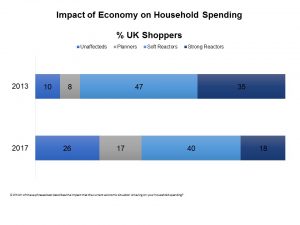Economic and political uncertainty is affecting consumer attitudes and choices, says Danielle Pinnington of Shoppercentric
2017 is certainly proving to be a roller coaster. Brexit talks are finally starting; the exchange rate remaining weak; prices on the increase; salaries failing to match inflation; and politics proving to be anything other than strong and stable.
This is the context in which UK shoppers are making the purchase decisions that are so crucial to a buoyant economy, and there are various signs that confidence is starting to weaken.
During the recession, we tracked the impact the economy was having on households, and at its worst in 2013 we found that the majority were having to make changes to spending. Compare this to 2017, and we see quite a different picture – but there are definitely signs of problems to come (see fig 1) with one in five already making changes ‘just in case’.
Whilst fewer shoppers are having to make major changes and one in four shoppers claim to be unaffected now vs. only one in 10 in 2013, the fact is that the majority of shoppers are starting to tighten their belts as times look increasingly tough.
What does this mean for in-store activation and communication? Well, the lessons learnt from the recession are a good starting point.
Back in 2009/10 the biggest shift in shopper psyche was from ‘I want it now’ to ‘Do I actually need it?’.
This was demonstrated by the emergence of prudent (rather than austere) shopper behaviour: being more careful to avoid waste; planning what to buy and avoiding being tempted to spend more; cooking from scratch; and making things go further.
Shoppers quite literally narrowed their view by focusing on what they actually needed. And when shoppers become more blinkered, in-store activation and communication needs to become more proactive in selling products.
To hit the mark, shopper marketing campaigns need to be more focused on delivering a benefit to shoppers, not just to brands or retailers.
Think about the successes during the recession: own-labels running campaigns to persuade shoppers to try their versions of well-known brands; solution-based campaigns such as ‘Dine in for £10’ and ‘Feed your family for a Fiver’ helping shoppers feel retailers were on their side; and enabling shoppers to make the most of the money available through money off coupons, link-saves or ‘extra product free’ promotions.
By taking those experiences on board, and applying the same principles to today’s situation then the new challenges can perhaps be seen as opportunities. If we all make the most of the tricks we learnt to survive the recession, we might find 2017 easier to cope with than some would have us believe. And perhaps we can all feel a little more confident in these times of change.
Danielle Pinnington is founder and owner of Shoppercentric, an independent agency specialising in shopper behaviour research, providing brand owners and retailers with the perspective that drives shopper marketing and retail strategies. It was established in 2004 and works with clients ranging from Cadbury to Debenhams.


























